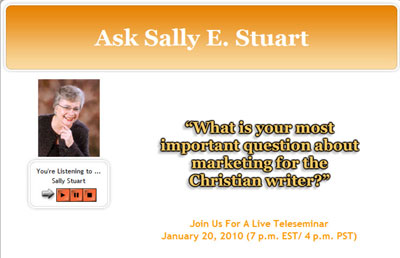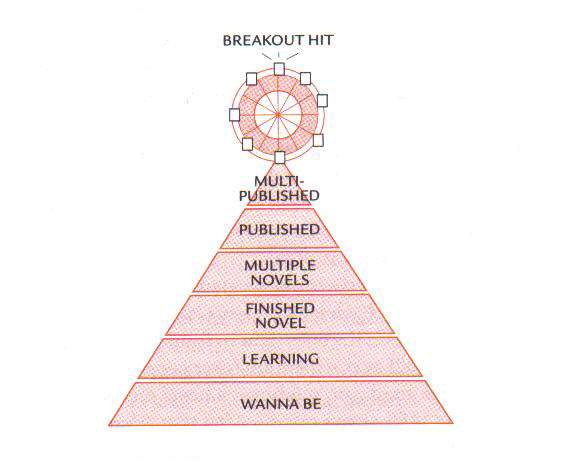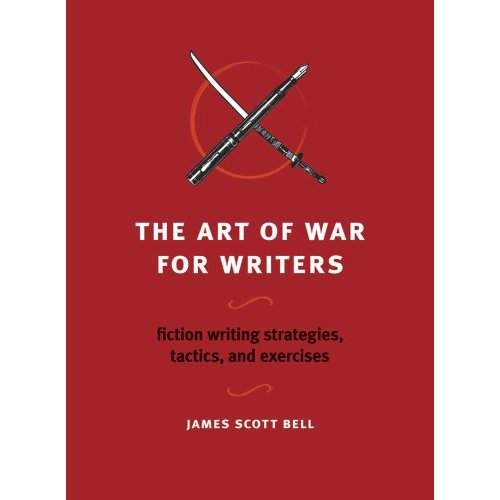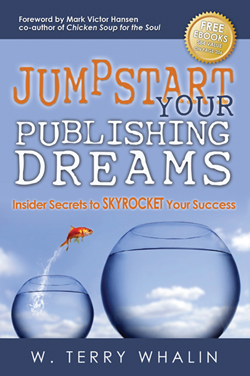
March 24, 2010
Welcome to the 40th issue to subscribers of Right Writing News. If you are reading this issue forwarded from someone, be sure and use the link below to get your own free subscription.
If you like what you see here, please forward this copy and use this link to subscribe.
Table of Contents
1) Let's Meet At A Conference in 2010By W. Terry Whalin
2) Tap A Major Book Market: Libraries
By W. Terry Whalin
3) 7 Ways to Write for Profit on the Internet
By Jimmy D. Brown
4) Back To Press
By W. Terry Whalin
5) Free Marketing Insight from an Expert
By W. Terry Whalin
6) Get Skilled in The Art of War for Writers
By W. Terry Whalin
Meet You At A Conference?
By W. Terry Whalin
Last weekend I was in Southern California speaking at the Southern California Writers Association. I enjoy meeting different writers, listening to their stories and seeing how I can help them through my work as a publisher at Intermedia Publishing Group.Between now and the end of 2010, I will be speaking at many different conferences in many different parts of the United States. I hope to see you at one of these writers' conferences. I encourage you to plan to attend one during the coming months.
You can always check the dates for my speaking schedule on this page.
At each conference, I will be teaching a different topic. I encourage you to check the specific conference schedule to see which classes I will be teaching and how we can schedule some time together to speak about your project. For example at one conference I teach a couple of single workshops where at another conference I teach a continuing session which goes over several days. Besides my teaching, I will be meeting individually with writers to learn about their projects and how I can help them through my role as a publisher at Intermedia Publishing Group.
I know that it takes effort to get to one of these conferences but I look forward to meeting you in person. From my experiences of attending these conferences, the effort is well worth the reward of new relationships and greater insight into your own writing life.

Tap A Major Book Market: Libraries
By W. Terry Whalin
I have always loved libraries. When my children were small, I made a weekly Saturday morning trip to the library, sat with a large stack of children's books and read to them.Now years later, the public library continues to be a part of my world. In the last six months, Scottsdale opened a new branch near my home and I have been making frequent trips to check out books, movies and music. I've learned to use their online system to reserve books (even some bestsellers). If you haven't been to your own library in some time, I understand because there is a great deal of information online yet knowing and using your local library is a valuable skill which I recommend to every writer. Take the time to learn how to use your local system. Make friends with your local librarians (who are a wealth of knowledge and information). It will be a boost to your own writing career.
I've published over 60 books with traditional publishers like Zondervan, Tyndale, St. Martin's Press and Alpha Books. Have you ever searched your library catalog for your own name? When I search the Scottsdale Library catalog (which is a large system), I find one book. This book has been out of print for many years and is one of about a dozen books that I wrote for someone else so my name appears in the small print--yet it does appear so I'm listed in the library.
As an author, I've read several how-to books which include chapters on how to reach libraries. The American Library Association (ALA) estimates there are more than 122,000 libraries in the United States including public libraries, academic libraries, school libraries and special libraries. In fact, more than ten percent of the book sales in the U.S. are to libraries. While I've searched, I've never found a way as an author that I can sell my books to a library. Yes, I've spoken at libraries (a good source and something I recommend to writers) but the sales question has always been a mystery to me--until I spoke with bestselling author Max Davis.
As an author, Max has sold his books to over 3,500 libraries. On Thursday, March 25th, I'm going to interview Max and he's going to give us the inside scoop about how he sells to libraries. You can hear the interview and ask a question at: AskTerryWhalin.com. If you can't attend the session, go ahead and sign up anyway because it will be recorded and everyone who registers will receive the replay link. This one technique of selling to libraries could be critical to your own book sales for this year.
To everyone who signs up for this teleseminar, they will also receive a free copy of my Ebook, Platform Building Ideas for Every Author. So head over to AskTerryWhalin.com and sign up for this free event.
7 Ways to Write for Profit on the Internet
By Jimmy D. Brown
Editor's Note: I'm honored to have Internet Marketing Expert Jimmy D. Brown. He is also the author of Lessons That Leave A Mark, which has just released (Intermedia Pubishing Group).Can you write? If so, then you can make money online.
No, I'm not talking about writing like Shakespeare or Stephen King. I’m not even talking about writing with such perfect grammar that your English teacher would smile from ear to ear.
Instead, I'm referring to your ability to use simple English to explain a process to your readers.
Not sure if you can do that?
Consider this: If you can give directions to a friend, then you can write a "how to" article. And if you can write a "how to" article, then you can put money in your pocket.
Here are seven surefire ways you can turn your content into cash…
1. Create Your Own Products
One of the most profitable ways to make money with content is by creating and selling your own information products. This includes reports, ebooks, home study courses and similar products.
Now here's the key: You probably won't become rich selling just one ebook. Instead, you'll become wealthy by creating a sales funnel where you sell more products and more expensive products to your existing customers.
That means you might start by selling $7 reports to bring customers into your sales funnel, but after that you should be selling them $47 ebooks, $100 courses… and so on.
2. Write Articles to Promote Affiliate Offers
The problem with making money by creating your own products is that you’re solely in charge of all the customer service hassles. You'll need to deal with cranky customers, you'll need to issue refunds, and you'll have to absorb the costs of chargebacks.
The solution? Write articles to promote other people's offers instead.
Tip: You can find digital affiliate products on sites like Clickbank.com. If you prefer to sell physical products, look to sites like CJ.com.
So, what do you do with these articles? Here are three ideas:
- Post them on your blog.
- Submit them to article directories like Ezinearticles.com, GoArticles.com and ArticleAlley.com.
- Upload them to social media sites like Squidoo.com and Facebook.com.
3. Become a Ghostwriter
If you'd rather sell your services, then you'll want to consider becoming a ghostwriter who creates articles, products and content for other people. You can promote yourself by:
- Join the WarriorForum.com and list your services under the "Warriors for Hire" section.
- Join freelancing sites like Elance.com or GetAFreelancer.com.
- Browse CraigsList.org and/or post your own ads.
4. Use Your Powers of Persuasion
If you have a knack for sales and persuasion, then you can make even more money by creating sales letters, ads and other sales materials for marketers (both online and offline).
In addition to advertising in the three ways mentioned above, you may consider approaching local business owners directly to offer your copywriting services.
5. Start a Membership Site
Instead of creating a series of related products to sell, you can create a membership site that you update with content monthly.
In essence, you're creating an automatic sales funnel, since your customers will get rebilled every month.
That means you can spend more time creating content and less time chasing down new customers.
6. Blog Your Way to Profits
If you really enjoy writing, then blogging is for you. That's because some of the most popular blogs are those where the owner blogs regularly – for sure weekly, but in some cases daily.
You can make money with your blog by:
- Publishing AdSense ads.
- Selling advertising space.
- Offering your own products.
- Selling affiliate products.
- Leveraging your traffic to gain other opportunities, such as publicity or even a book deal.
7. Create a Profitable Autoresponder Course
Finally, you can make money by creating a multi-part ecourse that's embedded with links to affiliate offers. Then you create a squeeze page to persuade people to join your ecourse and start driving traffic to this page. Once you build your list, you'll make money on autopilot… especially if you load up several month's worth of evergreen messages!
Example: You might write a 16 part weight loss ecourse that helps people lose 20 pounds. If you deliver these messages on a weekly basis, that's four month's worth of content. And each message gives you an opportunity to suggest additional solutions (such as weight loss supplements, exercise equipment, low-calorie recipe books and similar).
Summary
You just discovered seven proven ways to turn your content into cash online. Your next step? Start writing!
---------------------
Jimmy D. Brown is "retiring" all of his products and services! After 10 years as an internet marketer, Jimmy is closing down all of his current sites ... removing all of his ebooks, reports, membership sites, software programs, coaching programs, etc. To find out what's still available, visit here.
Back To Press
By W. Terry Whalin
The words are simple yet loaded with power: Back to Press. People who do not work in book publishing (as I do) often believe books sell by themselves. They do not. In fact, depending on the amount of books that you print for your first printing, many books never go back to press for a second printing.Yes, the books on the bestseller list return over and over for new printings--yet it is a rare book which lands on the bestseller list. What about the books that most people write? They do not return for another printing. In fact, many of them fade quietly into out of print status. It may shock some of you but I'm a realist and understand the Rule of Seven, which is a long-term advertising adage which explains an individual has to see an ad or learn about a product a number of times before they act on it (buy it).
As a publisher, I'm speaking with many people who have dreams and aspirations and visions about their own publishing. We provide the printing information to our authors and encourage them to be conservative and realistic in their plans. Some individuals follow our advice and others do not. Then a month or two passes after their book is released. They will call or email wondering why their book isn't selling in the marketplace. They discover that we are actively fulfilling what we have promised for our marketing efforts but it takes a partnership--the author and the publisher--to sell books. It does not happen in a vacuum or without the author assuming responsibility for the sales of their own book.
Ok, I'll get off my soapbox but I'm passionate about books getting into the hands of people--not just for the sales but because of the life-changing message they contain. That message only changes lives if the reader acts on the information. Over thirty-five years ago, I had my own personal transformational experience with a book. You can read about it here and notice the key involvement of a book called Jesus the Revolutionary. It is one of the major reasons that I'm still involved in book publishing.
Let's return to the topic at hand--a book going back to press. Recently my Jumpstart Your Publishing Dreams, Insider Secrets To Skyrocket Your Success went back to press for a new printing. It was not a simple reprinting.
Throughout the book, I referred to my literary agency which has been closed for over a year. In the process of reprinting, I removed those references and changed them to my current role as a publisher at Intermedia Publishing Group. Also with the first printing, I've received some suggested changes to the book from different readers. I kept these changes and have carefully gone through my book and handled each one with the reprinted book. Finally, I needed to add a dozen more pages of content to the book because the optimal length of the book was 12 pages longer. This request gave me an opportunity to revise, expand and update a chapter on marketing in the book. Also these changes have allowed me to label the book not simply a reprint but a revision. I've noted this information on the copyright page and the book has been issued a different International Standard Book Number (ISBN). Why is this detail important?
Dan Poynter explains, "Always include a new ISBN when you publish a revision so the book industry will treat the book as new. Your distributor will put it back in the front of the catalog as a new book. The book trade is new-product driven. Make a legitimate revision, assign a new ISBN and bar code to keep your book new."
With the revision release, I will be producing new press releases, new marketing efforts and doing other things to boost the presence of Jumpstart Your Publishing Dreams in the marketplace. My new efforts are tied to the revision of this book into the marketplace.
Free Marketing Insight from an Expert
By W. Terry Whalin

It is hard to get sound advice in publishing. Yes you can easily get advice but how about counsel that is filled with experience and wisdom. In my view, obtaining that advice can be a challenge at times.
If you want to know the inside scoop about the Christian market, I recommend you listen to this interview with Sally E. Stuart. For the last 25 years, Sally has produced an annual book which is a necessity for almost any Christian writer called The Christian Writer's Market Guide. Because this seminar is in "replay mode" you can immediately access the information from my 70-minute teleseminar with Sally Stuart. Get the information at: www.asksallystuart.com.
In addition, to the interview, Sally is giving every registrant a free copy of her chapter on book writing from Getting Published. This 23-page resource is not available any other place because Getting Published is out-of-print. This chapter contains a wealth of insight whether you write nonfiction or fiction plus advice on how to get an agent and what to do if your publisher goes out of business. You can download this chapter on the replay page for the teleseminar. I recommend you take advantage of this free resource.

Get Skilled in The Art of War for Writers
By W. Terry Whalin
When writers put words on paper, they are going to war--especially war with the voices in their head that tell them not to put words on the paper. In a little book loaded with wisdom and insight, James Scott Bell has written a powerful prescription for every writer--whether they are fiction writers or nonfiction writers in his new book, The Art of War for Writers.Following the pattern of Sun Tzu and his classic, THE ART OF WAR, Bell divides his book into three parts: reconnaissance or the mental game of writing, tactics or the writing craft and finally strategy or advice about the publishing business. The first and the last section are universal principles for any writer (fiction or nonfiction) while the tactics section is mostly specific to fiction writers.
One of the most fascinating illustrations in the book--and a dose of reality for writers is the stages of a writer's life on page 51:

I find that many writers want to jump to the top of the pyramid without going through the various stages that Bell points out. It's a valuable lesson.
You can pick up a 25-page sample of The Art of War for Writers

A skilled communicator, Bell mixes examples from other writers, his own personal stories and profound wisdom. I suggest you read this book at least twice. Once with your highlighter to mark many pages, then a second time in daily little chunks to inspire you to write the words only you can write.
The final pages of this title turn to five words from Sun Tzu, "The commander stands for the virtues of wisdom, sincerity, benevolence, courage, and strictness." With clarity and simple words, Bell challenges the writer in all five areas and these words are crafted from his years of experience in the publishing world. I loved this sentence in the courage section on page 258, "You have it inside you to fight this fight. Write, think about what you write, then write some more."
I highly recommend this book for writers of every persuasion.
